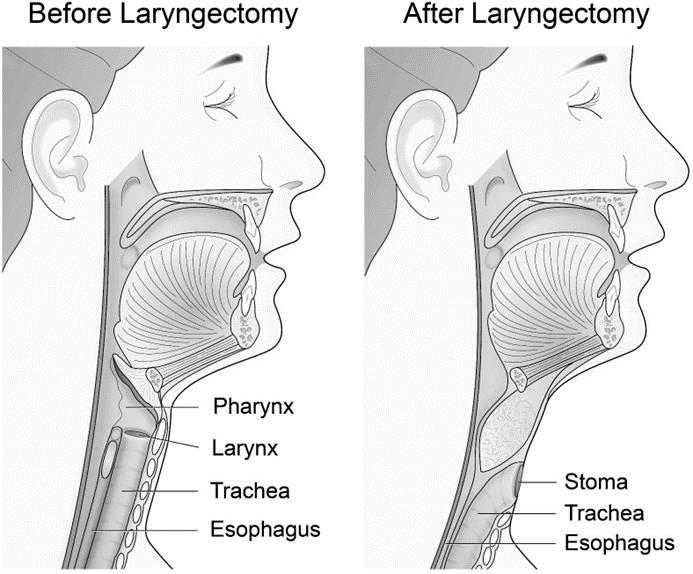A nurse is caring for a client following a total laryngectomy. Which of the following is the priority observation in the client's care?
Patency of the intravenous line.
Need for suctioning.
Integrity of the dressing.
Level of pain.
The Correct Answer is B
Suctioning is the priority observation in the client's care, as it prevents airway obstruction and respiratory distress caused by blood, mucus, or secretions. The client has a permanent tracheostomy and cannot cough or clear the airway effectively. The nurse should assess the need for suctioning frequently and perform it as needed, using sterile technique and maintaining oxygenation.
a) Patency of the intravenous line is important, but not the priority observation in the client's care. The intravenous line provides fluids, electrolytes, and medications to the client, but it does not affect the airway patency or oxygenation.
c) Integrity of the dressing is important, but not the priority observation in the client's care. The dressing protects the surgical site from infection and bleeding, but it does not affect the airway patency or oxygenation.
d) Level of pain is important, but not the priority observation in the client's care. The pain can be managed with analgesics and nonpharmacological measures, but it does not affect the airway patency or oxygenation.

Nursing Test Bank
Naxlex Comprehensive Predictor Exams
Related Questions
Correct Answer is ["A","C","E"]
Explanation
These clients have impaired swallowing, gag reflex, or level of consciousness, which increase their risk of aspiration while eating.
The other options are not correct because:
b. A client who has had prolonged diarrhea does not have a direct risk factor for aspiration, as diarrhea affects the lower gastrointestinal tract and not the upper airway or esophagus.
d. A client who has lactose intolerance does not have a risk factor for aspiration, as lactose intolerance causes abdominal cramps, bloating, gas, or diarrhea when consuming dairy products, but does not affect the ability to swallow or protect the airway.
Correct Answer is D
Explanation
Keeping the drainage system below the level of the client's chest prevents backflow of fluid or air into the pleural space and maintains negative pressure in the system.
a) Disconnecting the chest tube from the drainage system during transport is dangerous and can cause pneumothorax, infection, or bleeding. The chest tube should remain connected to the drainage system at all times unless ordered by the provider.
b) Emptying the collection chamber prior to transport is unnecessary and can interfere with accurate measurement of drainage. The collection chamber should be emptied only when it is full or at the end of each shift.
c) Clamping the chest tube prior to transferring the client to a wheelchair is contraindicated and can cause tension pneumothorax, as it prevents air from escaping the pleural space. The chest tube should only be clamped for a brief period when changing the drainage system or checking for air leaks, and only with a provider's order.
Whether you are a student looking to ace your exams or a practicing nurse seeking to enhance your expertise , our nursing education contents will empower you with the confidence and competence to make a difference in the lives of patients and become a respected leader in the healthcare field.
Visit Naxlex, invest in your future and unlock endless possibilities with our unparalleled nursing education contents today
Report Wrong Answer on the Current Question
Do you disagree with the answer? If yes, what is your expected answer? Explain.
Kindly be descriptive with the issue you are facing.
